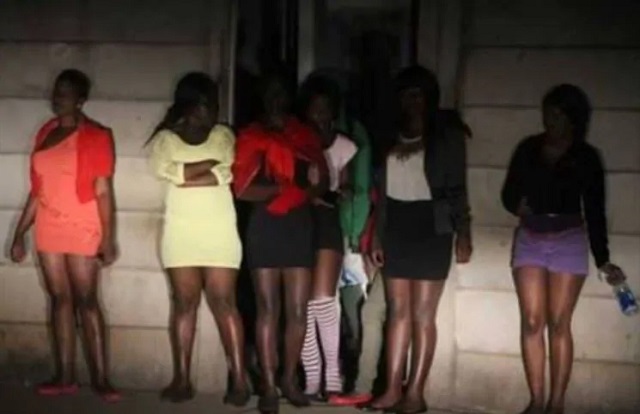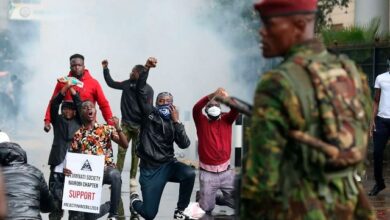Why African governments should legalize or decriminalize prostitution
In Uganda, prostitution and the sex industry are illegal and not decriminalized.

Op-Ed: The legalization/decriminalization of prostitution in Africa is a complex and multifaceted issue that varies significantly across the continent.
Currently the legal status of prostitution in African countries ranges from complete criminalization to partial legalization or decriminalization.
As of now, there are no African countries that have fully legalized prostitution in a manner similar to countries like the Netherlands or Germay.
However some African countries have adopted more progressive approaches by decriminalizing certain aspects of prostitution or regulating it in specific ways, for example in South Africa prostitution is illegal but there has been ongoing debates and legislative efforts to decriminalize it, South Africa is at the fore front the debates to decriminalize prostitution and the related activities pertaining to the sex industry under its Criminal Law(Sexual Offences and Related Matters)Amendment Bill 2022 (Mail Guardian newspapers 2022).
In Senegal prostitution is legally regulated and its legal but sex workers must register with the government and undergo regular health checks.
In Uganda, prostitution and the sex industry are illegal and not decriminalized.
However this industries are booming countrywide in the open and road sides especially at night, in happening places namely bars, entertainment places such as casinos, disco dancing halls, in lodges and hotels, in brothels, massage parlours, saloons, garages, workshops, in academic institutions and schools to mention but a few.
Despite the current legal status criminalizing prostitution and the sex industry activities, there is lack of resources and law enforcement personnel to adequately monitor these activities taking place any time of the day.
Legal status across African countries: These are categorized in three classes namely:
·Criminalization: In many African countries prostitution is illegal. This implies that the selling and buying of sex, as well as activities associated with prostitution and the sex industry (such as brothel-keeping and pimping) are regarded as criminal offenses.
Some of the African countries with strict laws against prostitution are Uganda, Nigeria and Tanzania. Despite this, prostitution is booming day or night under the watchful eyes of the law enforcement personnel and organizations.
·Partial legalization /decriminalization: Some African countries have adopted a more nuanced approach, where certain aspects of prostitution are decriminalized or regulated, for example in South Africa and Namibia while prostitution itself is illegal, there are ongoing debates, discussions and legislative efforts to decriminalize and regulate the sex industry to improve the safety and rights of sex workers.
·Legalization: Very few African countries have fully legalized prostituition.However there have been movements and advocacy efforts in some African countries pushing towards legalization of prostitution.
The argument for legalization often hinges on the potential benefits such as reducing human trafficking, improving public health through better regulation, and protecting the rights and safety of sex workers. For example, in Senegal prostitution is legally regulated, implying that prostitution in this African country is legal but sex workers are obligated to register with the government and under regular health checks.
This system aims to control the spread of sexual transmitted infections(STIs) and provide some protection to sex workers(Wikipaedia.org 2024).
Arguments for and Against Legalization of the sex industry
Arguments for legalization:
·Public health: Legalization of prostitution and the sex industry could facilitate better health checks and reduce the spread of sexually transmitted infections(STIs) by ensuring that health workers have access to better health services.
·Safety and Rights: Legalizing prostitution can improve the safety of sex workers by providing them with legal protection, recognition and reducing the exploitation and violence associated with illegal sex work.
·Economic benefits: The sex industry can contribute to the economy through taxation and regulation, this can provide an economic boost, and also reducing illegal underground activities. Sex workers should be seen as persons with a profession like any other person in gainful employment, and the sex industry also should be seen as any other employment industry.
Arguments against legalization:
·Moral and cultural concerns: In many African societies, prostitution and the sex industry are viewed as morally wrong and culturally unacceptable, leading to significant opposition to its legalization. Despite this opposition, prostitution is on the rise in most African countries.
·Risk of exacerbated human trafficking: It is argued that legalization could lead to an increase in human trafficking, as legal markets may attract illegal activities.
·Implementation challenges: Effective monitoring, regulation and enforcement of legalized prostituition can be challenging particularly with limited resources,personnel and weak instituitional frameworks (Human Rights Watch 2019).
Current efforts and discussions
There are ongoing debates and legislative efforts in various African countries regarding the legalization or decriminalization of prostituition. For example, South Africa has seen significant discussions and proposals to change the legal status of sex work to improve the safety and rights of sex workers.
Conclusion
Whether prostitution can be legalized in Africa depends on numerous factors, including legal, cultural, social, political and economic considerations. While countries may move towards decriminalization or legalization of prostitution and the sex industry to address public health and safety concerns, others may continue to uphold strict laws and regulations against prostitution due moral and cultural values.
The way forward will likely involve incessant debates and advocacy from various stakeholders. While no African countries have fully legalized prostitution, countries like Senegal have taken steps to regulate the sex industry.
Other countries such as South Africa and Namibia are in various stages of debates and reforms regarding the decriminalization, legalization and regulation of prostitution and the sex industry.
The situation continues to evolve as advocacy groups push for changes to protect the rights and the safety of sex workers. Moreover, any regulations and controls on sex workers and their activities need to be nondiscriminatory and be commensurate and comply with international human rights law.
The author is Kizito Simon Njaye, African Research Consult-Uganda Chapter, Research Associate.
Disclaimer: As UG Reports Media LTD, we welcome any opinion from anyone if it’s constructive for the development of Uganda. All the expressions and opinions in this write-up are not those of UG Reports Media Ltd. but of the author of the article.
Would you like to share your opinion with us? Please send it to this email: theugreports@gmail.com.






